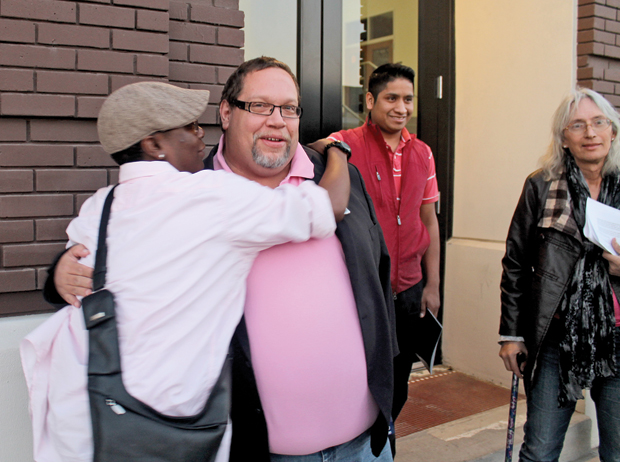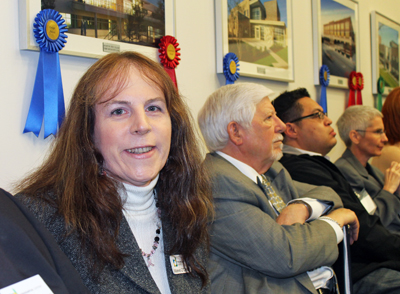Only 1 community college district trustee votes against change

CELEBRATION | GetEQUAL activist C.D. Kirven, left, hugs Rafael McDonnell, communications and advocacy manager for Resource Center Dallas, as trans rights activist Pam Curry, right, looks on after the Dallas County Community College District board voted Tuesday, Jan. 3, to add protections for transgender employees and students to its nondiscrimination policies. (David Taffet/Dallas Voice)
DAVID TAFFET | Staff Writer
taffet@dallasvoice.com
The Dallas County Community College District board of trustees voted Tuesday, Jan. 3 to add gender identity to the district’s non-discrimination policies. The vote came less than three months after the trustees initially declined to add the specific protections, saying the policies were unnecessary.
The trustees approved three measures this week. The first protects transgender employees from discrimination and harassment, while two additional policies cover students — in the student code of conduct and in the district’s nondiscrimination statement.
The policy change was first proposed last spring when Resource Center Dallas Communications and Advocacy Manager Rafael McDonnell contacted DCCCD Trustee Diana Flores, who has supported the policy change from the beginning.
“It wasn’t difficult at all,” Flores said after the board meeting about convincing her fellow
trustees to support the addition. “The LGBT community did a good job of informing the board. Congratulations to the community.”
Only five speakers addressed the board on Tuesday, although another five had signed up to speak.
Dallas County Community College graduate Brad Shankle offered a unique perspective in his remarks. “I struggled with gender dysphoria, although I found a way to deal with it,” he said, adding that having the policy in place while he was a student would have made campus life easier for him.
McDonnell gave the board facts and statistics: In a little more than a year, Dallas Independent School District, DFW Airport, Dallas County and Dallas Area Rapid Transit have all added nondiscrimination protections based on gender identity and expression. Around the country, 410 colleges and universities have protections based on gender identity and expression. And more than half of Fortune 500 companies have these protections in place, McDonnell said, specifically mentioning AT&T.
Earlier in the meeting, Wesley Jameson — who works for AT&T — was sworn in as the newest DCCCD trustee.
When McDonnell asked everyone in the audience who had attended to support the changes to stand, about 20 people responded.
RCD board member and DCCCD student Maeve O’Connor told the board her story. And GetEQUAL North Texas Regional Coordinator Daniel Cates, a student at El Centro College, told the board, “No matter who you are, you deserve a safe place to work and go to school.” He said that a “yes” vote would protect everyone and set an example for other colleges in the state.
Lambda Legal Community Educator Omar Narvaez told trustees that a transgender person is twice as likely to be unemployed as the general population and one in four has been fired simply because of gender identity.
Board Chair Jerry Prater then cut off public comments, telling those attending, “We have gotten your message, loud and clear.”
Five trustees were present to vote. Four voted in favor and only Trustee Bill Metzger voted no.
While the board was receptive to the message delivered at the January meeting, passing the policy took more than half a year from the time it was first proposed. And at one point during the fall, it looked like the protections would not even be considered.
When the board was briefed on the policy in October, some members said they thought amending the nondiscrimination statement was unnecessary because it was covered by sexual orientation, and because the city of Dallas prohibits discrimination. Although only two of the system’s colleges are located within the city of Dallas, the school’s attorney argued that the entire system was covered by the ordinance because the district’s headquarters is located in Dallas.
Confusion about the definition of sexual orientation stemmed from the wording in the 2002 Dallas ordinance. The city regulation only lists sexual orientation but the definition of the term within the ordinance includes gender identity.
But the city ordinance specifically exempts other governmental bodies. DCCCD is its own taxing authority and is, therefore, exempt from city regulations.
DCCCD is also not covered by Dallas County laws.
The county Commissioners Court amended its employment policy to include gender identity and expression in 2011. But DCCCD employees work for the community college district, not the county. And that employment policy would not cover students.
When the policy was proposed last spring, San Jacinto College, based in Pasadena east of Houston, was the only community college in Texas with gender identity protections.
In December Houston Community College added trans protections to its nondiscrimination policy.
With more than 81,000 credit students and 25,000 continuing education students enrolled in the fall 2011 semester, DCCCD is the largest community college district and the largest school in Texas. The district includes seven colleges on 13 campuses and employs 7,200 full- and part-time faculty, staff and administrators.
Statewide, there are 55 community colleges or community college districts. Just six of those districts have nondiscrimination policies that include sexual orientation.
In addition to the three with trans protections, those that only list sexual orientation are Tarrant County College with five campuses, Austin Community College with eight campuses in Travis County and Lone Star College System based in The Woodlands north of Houston with 14 campuses in Harris and Montgomery counties.
With passage of protection by DCCCD, more than 39,000 public sector employees in Dallas County are covered by the expanded policies.
This article appeared in the Dallas Voice print edition January 6, 2012.

















Thank you Rafael and everyone who was involved and also thank you to the DCCCD Board. The company I work for is revisiting their decision not to include gender in the revised employee hand book because of your hard work. Thank you! And David, thanks for this article too.